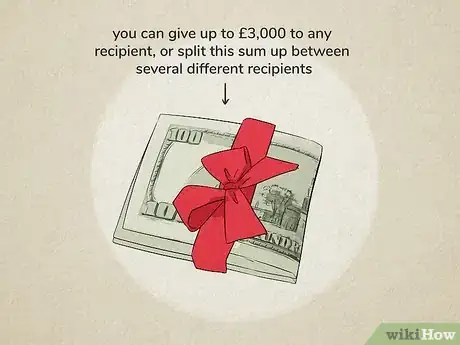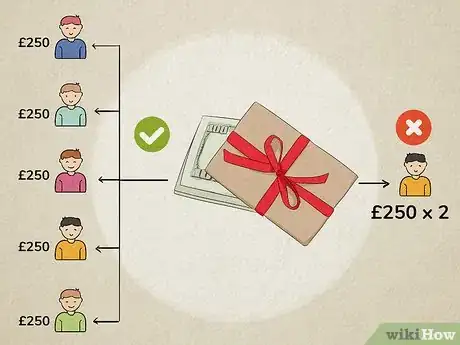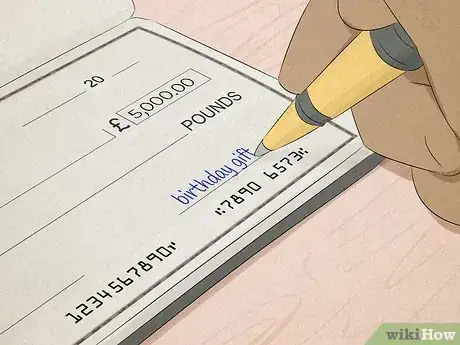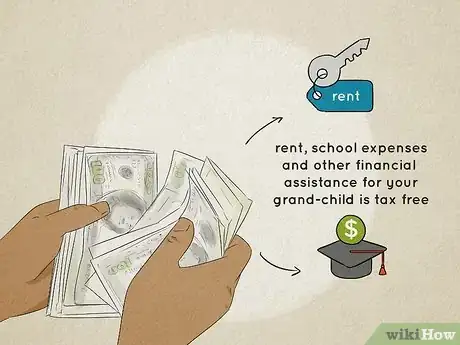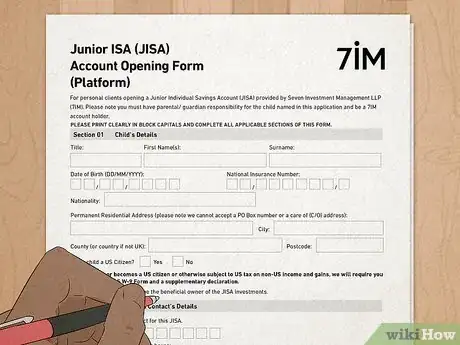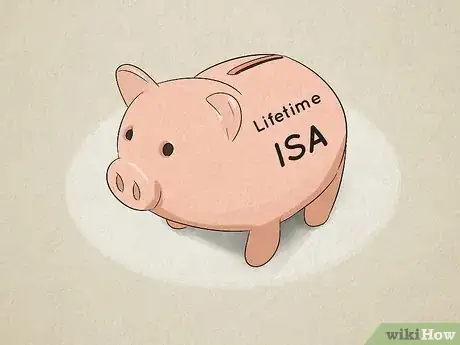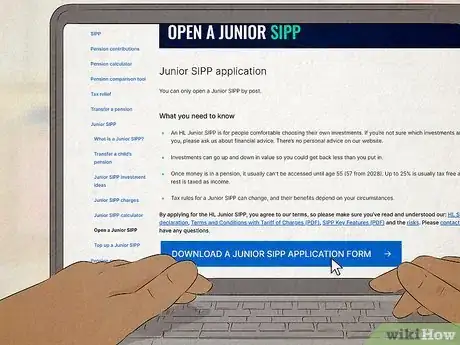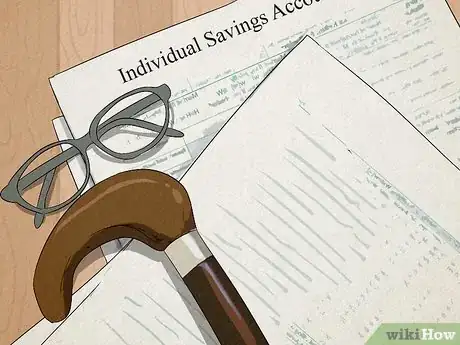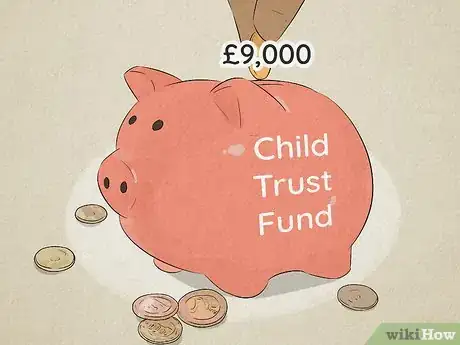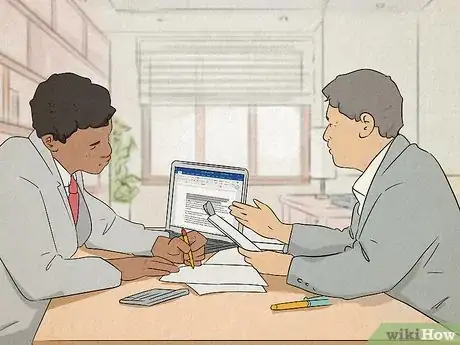This article was co-authored by wikiHow staff writer, Nihal Shetty. Nihal Shetty is a Writer and Editing Fellow at wikiHow who splits his time between Michigan and Mexico City. Before his role at wikiHow, he was an instructor of Russian literature at the University of California, Berkeley. Nihal received a BA in Comparative Literature from Columbia University and an MA in Russian at Berkeley.
There are 7 references cited in this article, which can be found at the bottom of the page.
This article has been viewed 4,503 times.
Learn more...
Many grandparents find gifting children and grandchildren money or other assets to be rewarding. It’s truly wonderful if you’re considering giving gifts as a grandparent, but you might be wondering how to deal with inheritance taxes, which can cut significantly into the amounts you give. Under these rules, gifts made 7 years before death may be subject to significant taxes. But don’t worry: there are ways to gift money and assets without running into these issues, and we’re here to walk you through them. Here are some ways that you can calculate how much grandparents can gift in the UK.
Steps
Gift up to £3,000 each year tax-free.
-
The annual exemption lets you gift some money free from inheritance tax. For each tax year, which runs from April 6th to April 5th of the next year, you can give up to £3,000 to any recipient, or split this sum up between several different recipients.[1] X Trustworthy Source Official UK government website Official website for the public sector of the UK government Go to source
- You can carry over any unused annual exemption forward to the next year. So, for example, if you gifted £2,000 this year with the annual exemption, you can gift up to £4,000 next year (£1,000 leftover from this year plus £3,000 from next year).
- However, you can only roll over any unused annual exemption for a single year. If you don’t use any annual exemption gifts for two years in a row, in the third year you can only gift £6,000 (£3,000 from that year plus £3,000 from the year before).
Give as many gifts of up to £250 as you’d like.
-
The small gift allowance keeps you from having to track smaller sums. You can always make gifts of less than £250, none of which are classified as taxable, so long as you divide these gifts between different recipients each year.[2] X Trustworthy Source Official UK government website Official website for the public sector of the UK government Go to source
- For example, if you’d like to give each of your 5 grandchildren a £250 gift, you can do so. However, you can’t give one grandchild two £250 gifts in the same year without digging into your annual exemption allowance.
Offer gifts on special occasions using your annual income.
-
Gifts you give from income you’ve gained in the current year are tax-free. You can give as much as you’d like on birthdays, Christmas, and other occasions, so long as this gift is coming from your yearly income. Your yearly income includes money you make from working or pensions, but not any funds you have saved in a nest egg.[3] X Trustworthy Source Official UK government website Official website for the public sector of the UK government Go to source
- For example, if you’d like to gift your child £1000 for their birthday, you can do this without paying inheritance tax, so long as that money is coming from income you’ve made that year.
Pay for living expenses tax-free.
-
There’s no limit to gifting rent or mortgage payments. You can pay rent for a child, or even offer financial assistance for other expenses, so long as you do so regularly, and use the income you make from work or pension support. This is a great way to help out people in your life who may still depend on you for financial help, so take advantage of it.[4] X Trustworthy Source Official UK government website Official website for the public sector of the UK government Go to source
- For example, you can give your grandchild a regular monthly payment of £100 for school expenses from your income, which will remain tax-free.
Give one tax-free gift per year for weddings and civil partnership ceremonies.
-
The amount you can give depends on that person’s relationship to you. You can also combine this allowance with your annual exemption to give a larger gift. Without using your annual exemption, you can gift up to:[5] X Trustworthy Source Official UK government website Official website for the public sector of the UK government Go to source
- £5,000 to a child
- £2,500 to a grandchild or great-grandchild
- £1,000 to another person
Avoid taxes by contributing to a Junior ISA.
-
Both cash and stocks and shares accounts are tax-free. You can actually set up either one or both accounts for a single child, so give it a try. The maximum amount that can be saved in a Junior ISA is £9,000. The child will take control of the money starting at age 16, but won’t be able to withdraw from it until they’re 18.[6] X Trustworthy Source Official UK government website Official website for the public sector of the UK government Go to source
- For a child to have a Junior ISA account, they must be under 18 and living in the UK.[7] X Trustworthy Source Official UK government website Official website for the public sector of the UK government Go to source
Make tax-free contributions to a Lifetime ISA.
-
Pay with your regular income or annual exemption to skip the tax. When you make a contribution to a Lifetime ISA of up to £4,000 per year toward a child or grandchild’s account, it’ll be supplemented by an additional 25% from HMRC![8] X Research source
- For example, if you were to use your annual exemption to pay £3,000 into your child’s LISA, this would gain an additional 25% (£750) from HMRC, giving you a total contribution of £3,750 that year.[9] X Research source
- Keep in mind that there are limits to what the money in a LISA can be withdrawn. Your child or grandchild can withdraw money from their LISAs in order to purchase a house, or for their retirement nest egg, with limited exceptions.[10] X Research source
Contribute up to £3,600 a year to a Junior SIPP.
-
A child pension plan is a very tax-efficient way to save for their retirement. You can contribute up £3,600 each year, all of which will remain tax-free. It might seem strange to save up for a child’s retirement, but this can be a great gift. With compound interest over time, these contributions can add up exponentially by the time a child reaches retirement age.[11] X Research source
- Keep in mind that a child pension plan will lock away this money until the child is in their 50s at the earliest. It’s still a great way to invest in a grandchild’s future, but you should know that the money won’t be easily accessible for some time.[12] X Research source
Pay in up to £200 a month to a Help To Buy ISA.
-
The Help To Buy ISA can ease a loved one’s way into homeownership. Because this scheme was closed in 2019, your child or grandchild will already need to have an account for you to contribute to it. But by making monthly payments into their Help To Buy ISA, you can steer clear of the inheritance tax, and also take advantage of the government’s supplement of 25% to all contributions to this account.
- You can continue to make contributions to a Help To Buy ISA until November 2029, so getting in as many contributions as you can now is a great way to help someone you care about purchase a home.
- Keep in mind that there are restrictions on what kind of home someone can buy with this kind of ISA. There is a purchase price limit of up to £250,000 for homes purchased with this ISA, which goes up to £450,000 for homes bought in London.
Add up to £9,000 a year to an existing Child Trust Fund.
-
Child Trust Fund incomes and profits are completely tax-free. However, the Child Trust Fund scheme ended in 2011, so you can only make these contributions if the child you’re looking to gift money to already has a fund. You can contribute up to £9,000 a year to the fund, which makes this option sizable if it’s available to you.[13] X Trustworthy Source Official UK government website Official website for the public sector of the UK government Go to source
Gift money and assets through a will.
-
Creating a will involves planning around the inheritance tax. The way the inheritance tax works is that, in most cases under UK law, beneficiaries of a will don’t have to personally pay taxes on assets and money bequeathed to them. However, if your estate is valued at above the threshold £325,000, it will be subject to an inheritance tax of 40% for all assets over this threshold.[14] X Trustworthy Source Official UK government website Official website for the public sector of the UK government Go to source
- For example, if you have an estate of £425,000, the £100,000 over the threshold of £325,000 will be subject to a 40% tax. This means that the total value of your estate after taxes is £325,000 plus £60,000 (£100,000 minus 40%), or £385,000.
- Giving your home to children or grandchildren will increase the threshold to £500,000[15] X Trustworthy Source Official UK government website Official website for the public sector of the UK government Go to source
- If you leave 10% of your estate to charity, there will be a reduced inheritance tax of 36%.[16] X Trustworthy Source Official UK government website Official website for the public sector of the UK government Go to source
You Might Also Like


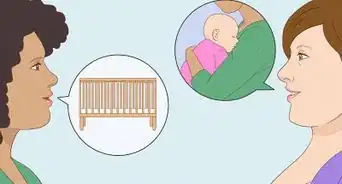







References
- ↑ https://www.gov.uk/inheritance-tax/gifts
- ↑ https://www.gov.uk/inheritance-tax/gifts
- ↑ https://www.gov.uk/inheritance-tax/gifts
- ↑ https://www.gov.uk/inheritance-tax/gifts
- ↑ https://www.gov.uk/inheritance-tax/gifts
- ↑ https://www.gov.uk/junior-individual-savings-accounts
- ↑ https://www.gov.uk/junior-individual-savings-accounts
- ↑ https://www.nutmeg.com/nutmegonomics/double-childrens-inheritance-thanks-lifetime-isa/
- ↑ https://www.nutmeg.com/nutmegonomics/double-childrens-inheritance-thanks-lifetime-isa/
- ↑ https://www.nutmeg.com/lifetime-isa/lifetime-isa-children-and-inheritance
- ↑ https://www.thetimes.co.uk/money-mentor/article/pensions-for-children/
- ↑ https://www.thetimes.co.uk/money-mentor/article/pensions-for-children/
- ↑ https://www.gov.uk/child-trust-funds
- ↑ https://www.gov.uk/inheritance-tax
- ↑ https://www.gov.uk/inheritance-tax
- ↑ https://www.gov.uk/inheritance-tax
About This Article

